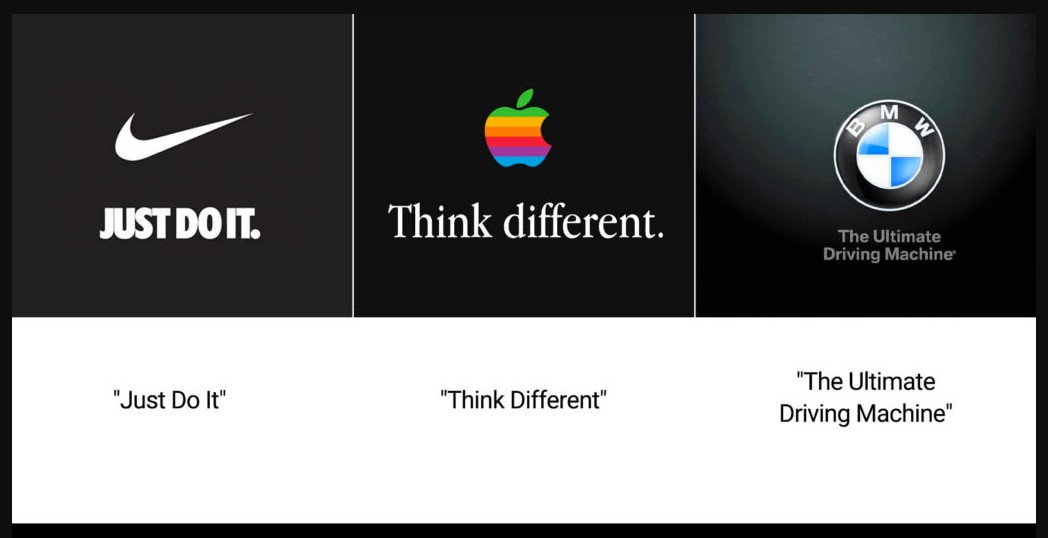A slogan is more than just a catchy sentence or a marketing gadget – it is an essential element of the brand image that can shape the perception of the public, influence behavior and improve the identity of an organization. Whether it is a commercial enterprise, a non -profit organization, an educational institution or a startup, a well -designed slogan communicates a basic message and connects with the public at an emotional or intellectual level. In the competitive landscape today, where the duration of attention is short and the noise is constant, the importance of a strong slogan cannot be overestimated.

1. Defines and strengthens the brand's identity
A slogan serves as verbal logo– a brief expression of the mission, values or the promise of the company. It completes the brand name and the logo presented visually to complete the brand's identity. For example, Nike's “do it” embodies action, empowerment and motivation. Likewise, NGOs use slogan as “because each life matters” to highlight humanitarian values and social commitment.
A powerful slogan can answer questions like:
- What does this organization represent?
- What type of impact does it aim to create?
- Why should people worry about it?
2. improves the reminder of the brand
Slogan are designed to be memorable. A well written slogan remains in the minds of people long after seeing them or hearing it. This is crucial for the reminder of the brand, especially when competing for attention on a crowded market or a cause space due. Short, rhythmic and resonant tagging emotionally are more likely to remember and repeat.
In the case of an NGO, a memorable slogan can help keep the cause alive in public conscience, increasing the chances of engagement, volunteering or donations.
3. Create an emotional connection
A slogan has the power to mention emotionswhich plays an important role in the decision -making of consumers and donors. While products or services meet practical needs, labels operate Aspirations, hopes and values. For a company, this could concern innovation, sustainability or customer orientation. For an NGO, it could be justice, compassion or empowerment.
By hitting an emotional rope, slogans strengthen trust and affinity, which makes people more likely to support, share or defend the brand.
4. Differentiated by competitors
A slogan offers a chance to highlight what makes a brand unique. In the sectors where several entities offer similar services or defend similar causes, a slogan can be the differentializer. He communicates what is distinctive on the organization in a succinct and engaging way.
For example:
- For profit: “Think different” (Apple) separated Apple from the generic PC crowd.
- For non -profit: “Be change” (inspired by the quotation by Gandhi) invites personal responsibility and action, often used by social justice campaigns.
5. provides consistency in messaging
A slogan offers a coherent anchor For all communication efforts. It guarantees that advertising, social media, events and public speeches, the main message remains aligned. This consistency strengthens familiarity and strengthens the brand's positioning over time.
For NGOs, the coherent use of a slogan between campaigns and reports can create a strong story and help supporters instantly identify the organization and its cause.
6. Boose marketing and awareness
A solid slogan is the asset of a marketing specialist. He:
- Add power to advertising campaigns.
- Help with social media virality.
- Improves narration.
- Increases the impact of public service advertisements or product promotions.
When included on websites, banners, leaflets and digital content, labels act as hooks which capture interest and cause more in -depth exploration.
7. Inspire the internal stakeholders
Slogan are not only for external audiences. Internally, a well -articulated slogan can serve as motivation currency. Employees, volunteers, partners and stakeholders come together, in particular when it sums up the mission or vision of the organization significantly.
It can instill pride, management and a shared meaning within teams – something particularly important for NGOs and social enterprises motivated by mission rather than profit.
8. Facilitates the expansion and endurance of the brand
A timeless and versatile slogan allows a brand of grow and evolve Without losing its essence. It can remain relevant even if products, services or projects diversify. A slogan like “connect people” (Nokia) transcends individual products and largely applies to the business portfolio of the company.
For NGOs, a large slogan such as “transformation of lives” can remain relevant in different programs – from health care education to environmental advocacy.
Make an effective slogan
To exploit all these advantages, the development of an effective slogan implies:
- Clarity – Avoid the jargon. Keep things simple.
- Brevity – Ideally under 7 words.
- Relevance – Reflect your mission, product or impact.
- Emotion – Use words that move the sensation.
- Originality – Standing competitors.
- Timelessness – Avoid trends that can fade quickly.
Conclusion
A slogan is more than an intelligent sentence – it is a strategic communication tool This can shape identity, inspire trust and stimulate commitment. For companies, it improves brand image and customer loyalty. For NGOs, it sums up the objectives and feeds the advocacy. Whether you are launching a startup, you build a global brand or run a basic movement, a convincing slogan is your chance to make a lasting first impression – and a powerful final echo.


